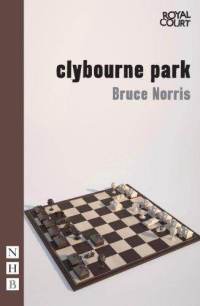Clybourne Park
| Clybourne Park | |
|---|---|
 |
|
| Written by | Bruce Norris |
| Date premiered | February 1, 2010 |
| Place premiered |
Playwrights Horizons New York City |
| Original language | English |
| Subject | Response to A Raisin in the Sun |
| Genre | Drama |
Clybourne Park (2010) is a play by Bruce Norris written as a spin-off to Lorraine Hansberry's play A Raisin in the Sun (1959). It portrays fictional events set before and after the Hansberry play, and is loosely based on historical events that took place in the city of Chicago. It premiered in February 2010 at Playwrights Horizons in New York. The play received its UK premiere at the Royal Court Theatre in London in a production directed by Dominic Cooke. The play received its Chicago premiere at Steppenwolf Theatre Company in a production directed by Steppenwolf ensemble member Amy Morton. As described by the Washington Post, the play "applies a modern twist to the issues of race and housing and aspirations for a better life."Clybourne Park was awarded the 2011 Pulitzer Prize for Drama and the 2012 Tony Award for Best Play.
Grieving parents Bev and Russ are planning to sell their home in the white middle-class Chicago neighborhood of Clybourne Park. They receive a visit from their local clergyman, Jim, as well as their neighbor Karl and his deaf, pregnant wife Betsy. Karl informs them that the family buying their house is black, and pleads with Russ to back out of the deal, for fear that area property values will fall if black residents move in. It becomes apparent that the black family moving in are the Youngers, the protagonists of A Raisin in the Sun, and the neighbor is Karl Lindner, the minor character from that play who attempted to bribe the Youngers into abandoning their plans to move into the neighborhood. The action is taking place approximately an hour following Karl Lindner's departure from the Younger's Hamilton Park residence, where they have rejected his bribery attempt. As arguments ensue about the potential problems of integrating the neighborhood, both couples awkwardly call on Russ and Bev's black housekeeper and her husband, Francine and Albert, to express their opposing views. Russ finally snaps and throws everyone out of the house, saying he no longer cares about his neighbors after their community's shunning his son Kenneth when he returned home from the Korean War, which contributed to Kenneth's suicide, which occurred inside the house.
...
Wikipedia
